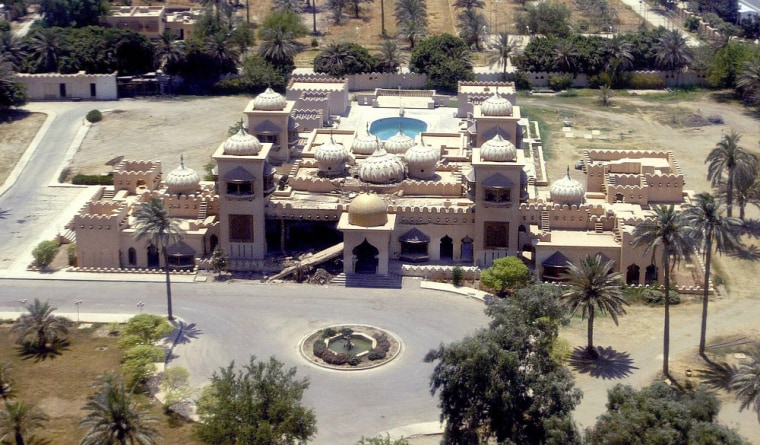It’s the biggest American handover of power since the United States and the Allies returned sovereignty to Germany and Japan after World War II.
But the Americans aren’t leaving. They’re merely adjusting their status Wednesday, shifting from running Iraq to guiding it.
“We are essentially going from being the sovereign government of Iraq to a U.S. embassy,” said Rob Tappan, who heads the occupation authority’s press office. “We become a partner of the people of Iraq as opposed to the governing body or a sovereign power.”
The United States, Britain and other nations remain deeply involved in Iraq. Their troops will stay on, and the American and British governments are pursuing a mammoth aid effort.
U.S. Ambassador John Negroponte will be “field captain” of a huge American presence — and custodian of an $18.4 billion program for rebuilding Iraq, which officials describe as the largest foreign aid project in U.S. history.
But the incoming diplomats face the same predicament that hamstrung the occupation authority: a guerrilla war that virtually imprisoned Iraq’s American and British rulers inside Baghdad’s sealed-off green zone. The new team will still have to conduct diplomacy behind sandbagged walls and in armored cars.
The U.S. Embassy will house a staff of around 1,000 Americans, including State Department diplomats, contractors and hundreds of employees from myriad U.S. government agencies on temporary assignment.
Some 700 Iraqis are expected to take jobs at the U.S. Embassy, which will also have four outposts around Iraq with 100 Americans in each. The U.S. Agency for International Development will have about 100 employees in Baghdad.
Britain’s new embassy plans a staff of around 100, along with 50 Iraqi workers. An additional 200 American and British consultants are expected to keep posts inside the Iraqi government.
Dwarfing past interventions
The effort dwarfs other recent U.S. interventions to install new governments, such as the Dominican Republic in 1965, Grenada in 1983, Panama in 1989 and Haiti in 1994, all of which were quick, small-scale military operations.
The 14 months spent running Iraq is far less than the Allied rule of World War II’s losers, however. The occupation of Japan ended in 1952 after seven years; West Germany didn’t regain full sovereignty until a decade after the war, in 1955.
That comparison isn’t quite apt, because Germany and Japan had to be resuscitated from the devastation of years of total war. In Iraq, the U.S.-led coalition won an easy victory over Saddam Hussein’s regime, making common cause with Iraq’s oppressed majority, although the insurgency is muddying that distinction.
The officials taking over from occupation chief L. Paul Bremer and his Coalition Provisional Authority are a who’s who of international diplomats.
Negroponte assumes his seventh presidential appointment, after leaving his job as President Bush’s U.N. envoy. He is perhaps best known for serving as President Reagan’s ambassador to Honduras, from where U.S.-backed guerrillas fought against the leftist government of Nicaragua.
Negroponte’s team includes James Jeffrey, former envoy to Albania, Turkey and Kuwait; Ron Neumann, ambassador in Bahrain; Steve Browning, ambassador to Malawi; and Robert Ford, a top Arabist also posted to Bahrain.
Britain’s embassy will be led by Ambassador Edward Chaplin, an Arabist who heads the Foreign Office’s Middle East directorate.
The diplomats’ toughest job will be the same that so frustrated Bremer and his staff: keeping themselves safe while meeting Iraqis.
Security “is our biggest preoccupation and concern, and that will take a lot of our resources,” said Francis Ricciardone, the State Department’s transition coordinator. “It’s very hard to be a diplomat in a country and to speak with the people you’ve got to speak with from behind walls or armored cars or guard details. But we do it and we manage.”
Much of the diplomacy will be restricted to the green zone, an expanded version of Saddam’s old governing compound that lives on as the seat of power.
For the near term, Iraq’s most important building will remain in American hands. Saddam’s former Republican Palace, now CPA headquarters, will become the embassy annex, housing most U.S. Embassy functions.
The palace will be returned to the Iraqi government once new quarters are found, CPA spokesman Dan Senor said.
The State Department is already negotiating to buy land in the green zone to build a new embassy, but that is likely to take a few years, Ricciardone said.
Iraq’s government will be temporarily headquartered in a bullet-pocked high-rise next to the Baghdad convention center. Until three weeks ago, the building housed the U.S.-picked Iraqi Governing Council.
